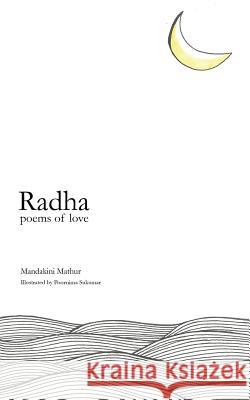Radha: poems of love » książka
Radha: poems of love
ISBN-13: 9781482851410 / Angielski / Miękka / 2015 / 68 str.
The story of Radha and Krishna offers a kaleidoscopic view of love-from the sensual to the spiritual. From this rich matrix, not only have artists, poets, saints, and religious cults drawn sustenance, but it has nurtured the mind of an entire subcontinent. In a predominantly patriarchal society where moral codes are laid out in terms of family and social responsibilities, the love between Radha and Krishna offers a delightful counterview. Here's Radha, a married woman elder to Krishna, spellbound by his charms, running to the forest on a full moon autumnal night of Sharad Purnima. To make this even more scandalous, he is sporting with other Gopis, quenching the thirst of all like undiscriminating rain speeding across a vast landscape. Each Gopi has a Krishna for herself and Radha too holds on to her own in this giddy vortex of love and fulfillment. As Krishna leaves for Mathura never to return, Radha waits. Later he plays the role of the mediator in the great war of the Mahabharata, which constantly blurs the line between the right and the wrong in an exploration of the concept of Dharma. Radha remains steadfast in her own Swadharma, which is her longing for Krishna, and stands by the banks of her Yamuna even today. For me, Radha is someone who has snapped off the beginning and the end of a love story. She is the eternal flow, dhara (which curiously is formed when you invert the syllables of Radha). Here any love story would be a mere wave thrown up by this deep current. These poems explore Radha's mind where the past, present, and future are one, where the journey and the destination are one.
The story of Radha and Krishna offers a kaleidoscopic view of love-from the sensual to the spiritual. From this rich matrix, not only have artists, poets, saints, and religious cults drawn sustenance, but it has nurtured the mind of an entire subcontinent.In a predominantly patriarchal society where moral codes are laid out in terms of family and social responsibilities, the love between Radha and Krishna offers a delightful counterview. Heres Radha, a married woman elder to Krishna, spellbound by his charms, running to the forest on a full moon autumnal night of Sharad Purnima. To make this even more scandalous, he is sporting with other Gopis, quenching the thirst of all like undiscriminating rain speeding across a vast landscape. Each Gopi has a Krishna for herself and Radha too holds on to her own in this giddy vortex of love and fulfillment. As Krishna leaves for Mathura never to return, Radha waits. Later he plays the role of the mediator in the great war of the Mahabharata, which constantly blurs the line between the right and the wrong in an exploration of the concept of Dharma. Radha remains steadfast in her own Swadharma, which is her longing for Krishna, and stands by the banks of her Yamuna even today. For me, Radha is someone who has snapped off the beginning and the end of a love story. She is the eternal flow, dhara (which curiously is formed when you invert the syllables of Radha). Here any love story would be a mere wave thrown up by this deep current. These poems explore Radhas mind where the past, present, and future are one, where the journey and the destination are one.











